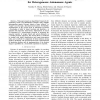Free Online Productivity Tools
i2Speak
i2Symbol
i2OCR
iTex2Img
iWeb2Print
iWeb2Shot
i2Type
iPdf2Split
iPdf2Merge
i2Bopomofo
i2Arabic
i2Style
i2Image
i2PDF
iLatex2Rtf
Sci2ools
ICRA
2009
IEEE
2009
IEEE
Probabilistic search optimization and mission assignment for heterogeneous autonomous agents
— This paper presents an algorithmic framework for conducting search and identification missions using multiple heterogeneous agents. Dynamic objects of type “neutral” or “target” move through a discretized environment. Probabilistic representation of the current level of situational awareness – knowledge or belief of object locations and identities – is updated with imperfect observations. Optimization of search is formulated as a mixed-integer program to maximize the expected number of targets found and solved efficiently in a receding horizon approach. The search effort is conducted in tandem with object identification and target interception tasks, and a method for assignment of these missions among agents is developed. The proposed framework is demonstrated in simulation studies, and an implementation of its decision support capabilities in a recent field experiment is reported.
Algorithmic Framework | ICRA 2009 | Multiple Heterogeneous Agents | Robotics | Target Interception Tasks |
| Added | 23 May 2010 |
| Updated | 23 May 2010 |
| Type | Conference |
| Year | 2009 |
| Where | ICRA |
| Authors | Timothy H. Chung, Moshe Kress, Johannes O. Royset |
Comments (0)

